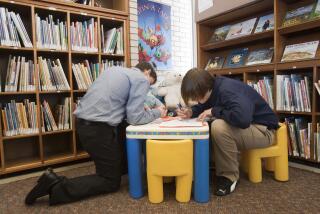What welfare really means
- Share via
Re “Middle-class jobless run into a welfare wall,” March 26
In your article, one of the people interviewed was wondering what happens to the middle-class families who were making good money.
Perhaps sounding coldhearted here, one can repeat the ubiquitous statement being tossed around these days -- what has happened to personal responsibility?
We hear of the plight of the middle class or above, people who have had no foresight. It appears they have not saved a dime, never mind the eight to 10 months of monthly income needed these days to hold them over after a job loss or health problem.
Is there a lesson here?
Karen Williams
Anaheim
::
People who qualify for almost $2,000 a month in unemployment should take a good look around and see what’s happening in the real world. There are vast numbers of people who are much worse off.
Public assistance is not intended to facilitate the continuation of a middle-class lifestyle; it is a safety net designed to assist the most desperate in keeping body and soul together.
My mother, who is 82, manages to get by on much less than many of the people cited in the article; perhaps she should write a book on how to get down to basics.
Carl Swanson
Santa Fe Springs
::
As today’s crisis pushes more and more middle-class families into the welfare office, their shock and humiliation shine a crucial public spotlight onto a system that drives away needy applicants and criminalizes people who have nowhere else to turn.
But let’s be careful not to use the “new poor” to uphold stereotypes about the “old poor.”
The majority of women and men who receive this aid have worked their adult lives, never imagining they would end up here. Welfare mothers exhaust other options before turning to public aid, and poor people have complained for decades that they were denied cash and food stamps, just because their low-wage job put them $10 or $20 above the eligibility cutoff.
Let’s not focus on the “new” middle-class poor while continuing to ignore the worsening problem of poverty among low-wage workers and the chronically unemployed and underemployed.
Alejandra Marchevsky
Los Angeles
More to Read
Sign up for Essential California
The most important California stories and recommendations in your inbox every morning.
You may occasionally receive promotional content from the Los Angeles Times.










